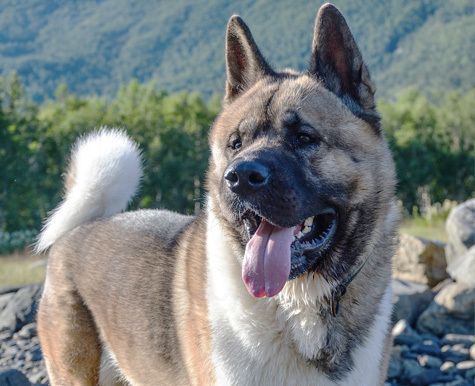






Akita
 Overview
Overview
Overview of Akita
Considered a "natural treasure" in Japan (where they are from), the Akita was saved from extinction in the 1800s, where a serious effort was then made to save seven of Japan's native dog breeds. The Akita is the largest of those seven breeds as well as the largest dog in the spitz family, weighing between 70 - 130lbs. Hachiko, arguably the most revered Akita, would wait for his master every day at Shibuya station to accompany him back home and even after his master's death, he continued to wait for him every day for the next nine years. Hachiko died on March 8, 1935, where a statue was built to commemorate his loyalty and dedication; even to this day, there is a yearly Hachiko ceremony! These beautiful pooches originate from Akita Prefecture in Northern Japan (more than a thousand years ago). Their iconic pricked ears, plush fur and curled tails were meant for trekking the polar terrain in the mountains of their homeland. Fairly new to American soil, the first Akita was brought over from Japan in 1937 by Helen Keller. Considered to be a very primitive breed meaning that they are closely linked to the wolf, the Akita can be viewed as a high-risk breed in some countries, so early socialization is key to raising a pup that plays nice. They come in almost any color and 3 different coat patterns: solid, brindle and pinto.
Common Health Conditions & Recommendations for Akita
Lymphoma:
Akitas can be prone to developing lymphoma (cancer of the lymphatic system) especially lymphosarcoma and osteosarcoma. The lymphatic system is part of the body's germ-fighting network which includes the lymph nodes (lymph glands), spleen, thymus gland and bone marrow.
Recommendations for Lymphoma in Akita Dogs:
Common Health Conditions & Recommendations for Akita
Hypothyroidism:
A condition that develops when the thyroid gland becomes underactive and can cause weight gain, depression, chronic ear infections, skin infections, hair loss and low energy levels. This condition is most commonly treated with diet and nutrient therapy.
Recommendations for Hypothyroidism in Akita Dogs:
Common Health Conditions & Recommendations for Akita
Adrenal Disorders:
Akitas can be born with a defective immune system, which can suddenly ‘switch on’ and attack their own skin, digestive system, adrenal glands or spinal column. These Adrenal disorders include Cushing’s disease and Addison’s disease.
Recommendations for Adrenal Disorders in Akita Dogs:
 Personality
Personality

Who doesn't want a dog who will follow them around from room to room, is fiercely loyal and whose only mission is to serve you? The Akita is all of those things and more! But training an Akita requires early socialization and consistency. For a first-time dog owner, the Akita may not be the best choice because of their high intelligence and powerful build; they can be willful and challenging to train. Working with an experienced trainer who is familiar with the breed can help a lot. Akitas can be great family dogs as long as they are socialized early (first 3-4 months) but can be aggressive towards their breed, especially the same gender, so they would be happiest in a one-dog household. Their plush coat requires daily brushing, frequent baths, and sheds twice a year. The Akita is for anyone who wants a dedicated companion (like Hachiko), has stunning looks and will always have your back!

 USD
USD
 Canadian Dollars
Canadian Dollars
